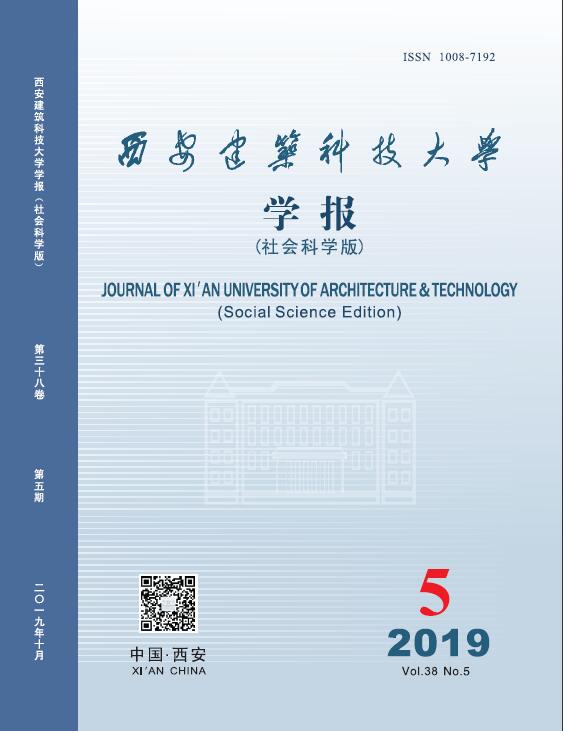(School of Libera Arts, Shaanxi Sci-Tech University, Hanzhong 723000, China)
Zaju of Yuan Dynasty; the Eight Immortals plays; Dream of the yellow Sorghum; spatial narrative; cultural implication
DOI: 10.15986/j.1008-7192.2019.05.016
备注
元代神仙道化剧中含有大量的八仙戏,体现出文人和百姓对以八仙为题材的杂剧的喜爱之深。《邯郸道省悟黄粱梦》(以下简称《黄梁梦》)是马致远等人合创的元杂剧,讲述钟离权度化吕洞宾得道成仙的故事,其中涉及到无限的地理空间和想象空间。以《黄粱梦》为主从八仙度人所涉及到的空间叙事理论来进行研究,从而窥探出以《黄粱梦》为主的的元代八仙戏剧在空间建构下的八仙故事及其文化意蕴。
There are a large number of Baxian(Eight Immortals)plays in the immortal Taoist drama in Yuan Dynasty, reflecting the deep love of literati and people for the dramas with the theme of Eight Immortals. Dream of the Yellow Sorghum created by Ma Zhiyuan and others, is a kind of Zaju of Yuan Dynasty. Though it is a story of Lu Dongbin, who has achieved divinity after meeting with Zhongli Quan, one of the eight immortals, the play involves unlimited space and imagination. The paper studies the spatial narrative theory in Dream of the Yellow Sorghum about Eight Immortals' enlightenment, and then explores the cultural implication in the story of eight Immortals under the spatial construction of Baxian plays in the Yuan Dynasty.
引言
元代八仙戏剧包含在元代神仙道化剧中,“儒学精神所赋予文人的理想得不到实现,无奈之余他们只能用戏曲来作以精神补偿,这便形成了元杂剧作者双重的人格,内心充满着入世不能、出世又不甘心的矛盾心态,这种矛盾心态的外化就是‘神仙道化剧'”[1]188。目前,学界对八仙故事的研究有一定的成果,学者们关注八仙故事的演变、人物形象以及八仙戏剧中的宗教意蕴,而忽视了八仙戏剧中的空间概念。随着文学地理学的兴起,将八仙文学和地理空间联系在一起成为文学研究的主要方向。在《全元戏曲》中写八仙戏的共有十二篇,完整保存下来的有马致远的《吕洞宾三醉岳阳楼》《邯郸道省悟黄粱梦》、岳伯川的《吕洞宾度铁拐李岳》、谷子敬《吕洞宾三度城南柳》、贾仲明的《铁拐李度金童玉女》《吕洞宾桃柳升仙梦》、无名氏的《瘸李岳诗酒玩江亭》《汉钟离度脱蓝采和》《吕翁三化邯郸店》九篇。八仙故事成为文学作品文人创作的素材,更是在民间百姓心中有着非凡的意义。本文以元代马致远、李时中、花李郎和红字李二四人所著《邯郸道省悟黄粱梦》(简称《黄粱梦》)为例,从空间叙事的角度探究吕洞宾得道成仙的双层空间文化内涵。
1 地理空间及其叙事模式
时间和空间密不可分。空间维度和时间维度对于小说和戏剧的刻画都是必不可缺的元素。“空间叙事重视叙事文本的空间架构、语言的可逆性和地域空间的隐喻性。”[2]地理空间是故事情节发生的载体。《黄粱梦》主要叙事钟离权度脱吕洞宾得道成仙的故事。吕洞宾在梦中经历尘世的酸甜苦辣、恩怨情仇,幡然醒悟,远离尘世,得道成仙。
地理空间包含着静态的空间和动态的空间,而舞台所展现的空间就是在表演人物和场景转化中进行的动态空间。人物在舞台上进行唱念做打,在不同情景下需要对剧情发展进行推动。戏剧和小说最大的不同在于戏剧是通过场面的冲突和舞台表演来推动剧情,表现创作意图。正如陈瘦竹所说“剧作家用悲剧、正剧或喜剧等样式来反映生活,决定的关键在于生活矛盾的性质以及他的美学评价,而不是直接、正面或间接、侧面等反映方式”[3]286。剧作者将对现实生活的反映和内心感情通过演员的表演呈现在舞台上。“【醉中天】假饶你手段欺韩信,舌辩赛苏秦,到底个功名由命不由人,也未必能拿准。只不如苦志修行谨慎,早图个灵丹腹孕,索强似你跨青驴踯躅。”直接由正末反讽文人的不得志。
人物和物体通过空间来运转,向观众展示发生事件的始末。钟离权度脱吕洞宾黄粱一梦的故事就在黄化店这个大空间上演。剧中次要人物都是由钟离权和骊山老母所幻化而成。主要人物是我们关注的故事主要承载者,而次要人物的存在推动着主人公和事情向前发展,同样不可或缺,此时的空间就是为故事发展提供场地。空间中会有场景的存在,场景不仅仅是空间的体现,更是承载着整个文学意蕴的内在,为故事文本在舞台上的演绎增添了无限的扩展和延伸。梅新林曾说到“借用‘场景'一词而提出‘场景还原',旨在强调从文学概念或对某种文学现象的概括向具体鲜活、丰富多彩的特定时空还原,向更接近文学存在本真的鲜活状态还原,并通过不同时空的场景链接而走向动态化、立体化、集成化与虚拟化。”[4]舞台场景的简易是因为受戏剧舞台表演空间的限制。在戏剧中只是对场景进行简单的描述,直接让演员通过说唱形式和动作提示人们故事情节的改变。“以并进的表演展示同时异地或异时同地发生的故事, 通过舞化的动作形成热烈的空间感,在同一舞台上表现环境和时间的变迁, 以充满符号的暗示激发观众对舞台时空无穷的想象。”[5]
场景的瞬间转移需要靠演员精湛的演技,能将戏剧脚本中人物角色根据剧情需要收放自如,在有限的空间里缩短时间,由人物的动作和语言向观众告知场景的转换。第二折中吕洞宾自述“到的阵面上,卖了一阵,与了我三斗珍珠,一提黄金,领军回还。来到家门首”[6]195,还有通过解子言语“兀那吕岩,我也是好义的人,到这深山旷野中,我回去也”[6]202。直接用一句话就交代了事情的经过,实现了场景的瞬间转移,但又不会让读者和观众糊里糊涂。“舞台场地和演出时间限制、剧本中的时空意识只能以虚拟化的程式展现给观众,观众再通过个人想象来完成脑海中的建构。”[7]
《黄粱梦》的叙事方式和元代其他八仙戏剧有着同样的叙事模式。八仙戏的度化方式具有反复叙事的特点。浦安迪的《中国叙事学》中指出“中国叙事文学和中国哲学一样,是用‘绵延交替'及‘反复循环'(即我所用的‘ceaseless alternation'和‘cyclical recurrence')的概念来观察宇宙的存在,来界定‘事'的含义的。”[8]123以及提到叙事的“反复循环”方式时谈到“中国最伟大的叙事文作者并不曾企图以整体的架构来创造‘统一连贯性',它们是以‘反复循环'的模子来表现人间经验的细致的关系的”[8]123。
《黄粱梦》秉持了八仙故事中一贯的度人方式,就是由仙人寻到带有灵性的凡人、由八仙之一来进行点化、劝服、幡然醒悟、得道成仙。这种模式的应用不仅仅体现在八仙故事上,其他的神仙道化剧也是点化、劝服,进行死缠烂打的度脱凡人。这种由仙到凡再到仙的圆形叙事结构,首尾呼应,始于哪里终于哪里,回归本真。“循环叙事模式是不同于线性叙事的一种空间化的叙事模式,它呈现的是一种圆环结构,体现着天人合一的思想。”[2]第一折中“阆苑仙人白锦袍,海山银阙宴蟠桃。”[6]187最后又“则今日证果朝元,拜三清同归紫府。”[6]212,天人合一达到人与自然的平和状态,将事物归于本真。同时也体现在人物命运的重复叙事模式。《黄粱梦》中“东华帝君领群仙上”[6]212,最后同归紫府,可以说所有的八仙戏剧都是这样的结局。由地理空间走向了想象空间,可谓是从现实空间和想象空间的交叉中走向了最终的想象中的虚拟空间。每一个被度脱的人物经由神仙的劝说或者是威逼利诱,终于愿意抛却尘世的富贵和诱惑,得道成仙。地理空间为叙事的发展奠定了基础,想象的空间为叙事增添色彩。
2 想象空间及其叙事结构
“异域空间与人间转化的方式通常分为两种:一是借助梦境来实现,二是通过出与出间的切换。”[7]仙界作为异域自是和现实空间不同,在此发生的一切情节都是作者为了抒发心中所感而特意营造出的空间之地。“‘神仙道化'剧的宗教精神直接来源于‘全真'、‘正一'等元代的主要道教,所以道教带有强烈神幻色彩的道术给‘神仙道化'剧插上了想象的翅膀。”[1]208《黄粱梦》首先出场的人物是东华帝君,东华帝君派正阳子钟离权和骊山老母去点化吕洞宾,此三人都是仙人,代表的是想象中的仙界。神仙拥有法术,可以幻化出任何虚拟的空间。《黄粱梦》中由钟离权为吕洞宾编织的黄粱梦可以说是整个戏剧的精华之所在。
“黄粱”这一意象在剧中出现数次,成为全剧中最大的伏笔,体现出人生如梦,梦如人生的哲理观。可以说除了第一折之外,剩余三折都是吕洞宾“黄粱梦”的场景。吕洞宾出场进入黄化店“将这二百文长钱籴些黄粱”[6]188,央求婆婆做些饭与其吃。“我教这一颗米内藏时运,半升铛里煮乾坤。投至得黄粱炊未熟,他清梦思犹昏。”[6]191吕洞宾醒后问婆婆“饭熟了未?王婆云还饶一把火儿”[6]211。最后“兀的是黄粱未熟荣华尽,世态才知鬓发皤,早则人事蹉跎”[6]211。数次问到黄粱梦,而黄粱还未煮熟,暗示时间之短,在有限的时间里营造了一个无限的空间。钟离权为了劝服吕洞宾,让吕洞宾在梦中经历了十八年。“吕岩也,你既要睡,我教你大睡一会,去六道轮回中走一遭。待醒来时,早已过了十八年光景,见了些酒色财气,人我是非,那期间方可成道。”[6]191十八年,时间的无限性,给虚拟的空间和现实的空间更多交叉转化的演变。“戏剧作为综合艺术,既有时间性,又有空间性,它必须在一定的时间内完成一个有连续情节和动作的戏剧事件,同时,它必须在一个有限的空间内( 舞台)完成对于剧情的展示。”[9]
梦境中的十八年在戏剧舞台有限的时间和空间之内,不可能一下完成,只有借助梦境才使得这发生的一切成为可能。“风吹羊角,雪剪鹅毛,飞六出海山白,冻一壶天地老。”[6]203短短的几字勾勒出一幅冰天雪地的画面。虽说是吕洞宾在梦中的场景,但对于舞台上的人物表演和场景刻画有着较高的要求。此情此景会让读者心中一紧,不由得为吕洞宾三人捏一把汗,担心受伤的吕洞宾和年幼的孩子在这种环境下如何支撑下去,增加读者的空间想象力。梦中吕洞宾在这断酒、断财、断色和忍气中经历人生的不同阶段,每次都是人生的重大转折,可以说剧中断酒、断财、断色和儿女被醉酒壮士摔杀属于四次剧作的高潮,一次比一次扣人心弦,最终在儿女被摔死之后也将剧情推向了终极高潮,使得吕洞宾看透人世,终愿被点化。“‘神仙道化'剧中的梦幻,最大的特点是用超现实的东西表现的正式现实的东西,它不像现代精神分析家所说的梦是潜意识的产物,具有大量的非理性成分,而是作家理性思想的表现,在这些梦幻中展现的是元代失意文人的精神世界,同时也有对‘全真教'普度众生的演义。”[1]212
“黄粱梦”情节在八仙故事不断改编的情况下一直保留着。唐代沈既济的《枕中记》首次通过“黄粱梦”情节模式叙述了吕洞宾度脱卢生成仙的故事,唐代李公佐的《南柯太守传》记载淳于棼在梦中经历一辈子,元末明初贾仲明的《吕洞宾桃柳升仙梦》通过梦点化度脱了翠柳和娇桃二人,元代范子安的《陈季卿误上竹叶舟》中吕洞宾用道术将竹叶幻化成小舟,让在科考中屡次失意的陈季卿乘舟回家,在最后的落水中醒悟,愿意随吕洞宾得道成仙; 元代岳伯川的《吕洞宾度铁拐李岳》中岳寿惊吓而死。因被吕洞宾收为徒弟而借尸还魂到瘸子李屠身上,称为铁拐李岳。又因岳李两家都要认李岳,只好随吕洞宾出家,以望成仙; 明代时汤显祖的《邯郸记》要讲述的是吕洞宾度脱卢生时为其编织梦境,在梦中娶妻崔氏并受其资助打点考中状元,在梦中经历官场险恶后因纵欲过度而死。卢生最终醒悟,随吕洞宾去当扫花使者; 清代蒲松龄《聊斋志异》卷四有《续黄粱》,认为此应为《邯郸记》的续编,叙述曾孝廉在寺庙中做梦经历相国、阴间以及托生后恶有恶报的因果循环之事,反映了社会现实的残酷和黑暗。后来就用“黄粱一梦”来比喻虚幻不能实现的梦想。可以说在中国古代戏剧中以梦命名或者在某一折中出现含有梦境情节的作品还有很多,这里就不再一一赘述。
3 双重空间叙事下的文化意蕴
人们生存的社会空间和以仙界为媒介的虚幻空间在戏剧中双重变换。《黄粱梦》中提到“您睡着了,贫道自会蟠桃会去也”[6]192。吕洞宾在钟离权编织的梦中进行了十八年之久,而钟离权却只是参加了个蟠桃会。在短暂的社会空间中将虚幻空间无限的延长,使得人们在虚拟的世界里将现实的残酷一一上演。在《黄粱梦》中作者塑造的社会环境这一个大的空间为世人脱离现实环境,躲避现实的折磨而提供了生存的利器。
通过对空间叙事的研究将以《黄粱梦》为代表的八仙戏所展现出的社会现象反映出来,即杂剧作家企图借助道教神仙来麻痹自己以及对神仙世界的向往。社会环境下的现实空间和想象空间所构成的生存环境给文人作家们更多的喘息机会。我们知道元代时期是全真教发展的鼎盛时期,此时全真教和八仙的结合将以马致远为代表的文人的精神面貌和内心变化提供了发泄的契机。因为全真教创始人王重阳一开始就把钟离权和吕洞宾视为本教的祖师,为了扩大全真教的影响,更是宣传自己是吕洞宾的嫡系大弟子。除此之外,更是因为“宋元以来商业经济的发展,蒙古大一统后南北经济文化的交流,促使商业城市大量涌现,市民阶层迅速壮大,城市勾栏瓦舍及农村神庙戏楼舞台的出现,促成了戏曲演出的固定化、舞台化,尤其是戏曲演出的社会化、商品化,推动了戏曲的竞争和创作的发展,为元杂剧的兴盛繁荣提供了有利的社会条件:充分的物质基础和浩大的观众队伍”[10]。这些存在的外在和内在条件将能帮助我们更好地理解当时社会下八仙文化对世人精神的重要性。
以马致远为代表的文人历经半世参看官场沉浮,人生并不得意,心中的惆怅无法排遣。一方面元代科举制度取消,入仕之路被阻断,造成文人社会地位的卑微,这是对他们精神的迫害; 另一方面也缩近了与平民百姓的距离,使他们的作品更贴近下层民众,切身体会百姓苦难,用笔墨演绎世间情怀。文人们进行创作的杂剧中饱含出入世的矛盾和纠结,体现出作者人生的痛苦和无奈,他们将对现实的逃避转移到文学创作中,无疑是寻找精神上新的归宿。元杂剧中以八仙戏为主的神仙道化剧体现出马致远等元代文人希望全真教能成为自己的依托,从马致远进行了《西华山陈抟高卧》《吕洞宾三醉岳阳楼》《邯郸道省悟黄粱梦》和《马丹阳三度任风子》四篇神仙道化剧就可看出其希望得道成仙。《黄粱梦》中钟离权多次向吕洞宾描述仙界的悠哉和成仙之后的洒脱自由,“出家人长生不老,炼药修真,降龙伏虎,到大来悠哉也呵”[6]189。“俺那里自泼村醪嫩,自折野花新,独对青山酒一尊。闲将那朱顶仙鹤引,醉归去松阴满身。泠然风韵,铁笛声吹断云根。”[6]190“功名二字,如同那百尺高竿上调把戏一般,性命不保,脱不得酒色财气这四般儿。笛悠悠,鼓冬冬,人闹吵,在虚空。怎如的平地上来,平地上去?无灾无祸,可不自在多哩。”[6]190钟离权向吕洞宾描述的神仙世界中的悠哉闲适又何尝不是马致远等文人心之所愿,这就是杂剧作家在双重空间下追寻人生自由的旅程,他们消极避世,却又做着最后的抗争。
空间叙事反映了八仙得道对于人们的世俗生活和审美意识有着重要的文化意义。“八仙神迹是宗教信仰层次与民俗信仰层次之间联系的重要纽带,一方面,它是道教徒宣传宗教教义的重要工具; 另一方面,它又是民俗信仰者寄托自己希望的重要根据。”[11]225-226八仙中神仙的存在以及由凡人被度脱成为神仙体现出双重空间下人们对神仙的敬畏,对宗教信仰的热忱。“八仙以其鲜明的形象特征,慈悲度人的济世态度深入世俗百姓心中,而世俗信仰中的功利性目的使八仙信仰得以历史性的延续,渗入百姓节日民俗、婚嫁礼俗及日常习俗之中,成为民俗活动中的重要部分。”[11]94凡人被度脱成仙更是给世俗百姓更多的希冀,将八仙故事融进百姓生活,拉近以神仙为主的虚幻空间和以百姓为主的社会空间的距离。但同时八仙戏中八仙人物形象又反映出八仙故事在人们心中的世俗化特征。八仙戏在市民百姓的传播过程中不断进行改编,将神仙的外在形象更贴近世俗之人。可以说“在八仙的身上,反映的是千百年来普通百姓的世俗理想,体现的是历代民众的群体审美意识。”[11]78在空间叙事下为想象打开一扇大门。元代的八仙戏剧主要是对神道世界的描写,表现出对俗世的厌恶,以求得道成仙实现对自身的超脱。不仅仅是因为元代八仙戏剧的神仙道化思想影响,更多的是此时的元代文人未能给自己找到现实中的出路,文人在创作的过程中给自身和观众以更自由的想象空间。文本叙事中包含了对民间以及宗教文化等内容,体现出了特殊社会时期下宗教文化对文人和普通百姓的深刻影响。
总之,从空间叙事角度研究《黄粱梦》对我们了解元杂剧中的八仙戏的历史情怀有着重要意义,可以说元代神仙道化剧的兴盛,带动了元杂剧中八仙戏的广泛传播。元代八仙戏不仅仅是文人宣泄情感的载体,更是在传播的过程中将八仙文化发扬光大。以《黄粱梦》为主的元代八仙戏的空间描写使我们将八仙文化与空间叙事紧密连接,对于更多学者从广阔的空间等角度发现以八仙戏为代表的中国传统文化的魅力。
- [1] 高益荣.元杂剧的文化精神阐释[M].北京:中国社会科学出版社,2005.
- [2]孔真.论西游记的空间性叙事[J].南京师范大学文学院学报,2017(2):28-33.
- [3]陈瘦竹.戏剧理论文集[M].北京:中国戏剧出版社,1988.
- [4]梅新林.文学地理学:基于“空间”之维的理论建构[J].浙江社会科学,2015(3):122-136.
- [5]郭妍琳.从空间感知理论谈中国传统戏曲舞台空间[J].南京工业大学学报,2003(12):58-60.
- [6]王季思.全元戏曲:第2卷[M].北京:人民文学出版社,1999.
- [7]贺倩.《六十种曲》风情剧时空研究[D].重庆:重庆师范大学,2018.
- [8]浦安迪.中国叙事学[M].北京:北京大学出版社,2018.
- [9]王建科.论元代家庭剧的时空艺术[J].陕西理工学院学报,2013(3):59-64.
- [10]郭延龄.神仙道化剧和八仙的形成[J].榆林学院学报,2017(1):96-104.
- [11]王汉民.八仙与中国文化[M].北京:中国社会科学出版,2000.
